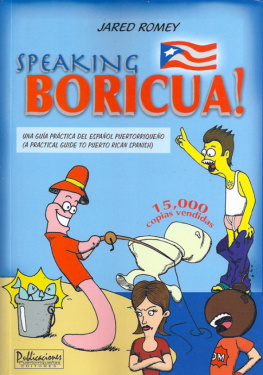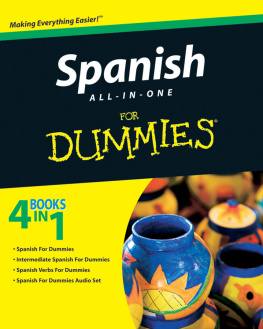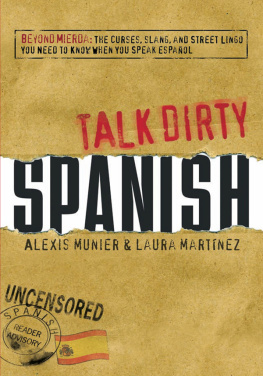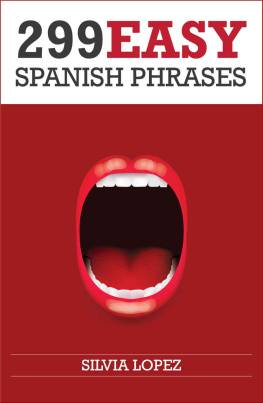The RED-HOT Book of Spanish Slangand Idioms
Other titles by the same authors
Streetwise Spanish
Streetwise Spanish, CD edition
Streetwise Spanish Dictionary/Thesaurus
Tune Up Your Spanish
The RED-HOT Book of Spanish Slang and Idioms
5,000 Expressions to Spice Up Your Spanish
Mary McVey Gill & Brenda Wegmann


Copyright 2007, by The McGraw-Hill Companies, Inc. All rights reserved. Except as permitted under the United States Copyright Act of 1976, no part of this publication may be reproduced or distributed in any form or by any means, or stored in a database or retrieval system, without the prior written permission of the publisher.
ISBN: 978-0-07-170907-1
MHID: 0-07-170907-X
The material in this eBook also appears in the print version of this title: ISBN: 978-0-07-143301-3, MHID: 0-07-143301-5
All trademarks are trademarks of their respective owners. Rather than put a trademark symbol after every occurrence of a trademarked name, we use names in an editorial fashion only, and to the benefit of the trademark owner, with no intention of infringement of the trademark. Where such designations appear in this book, they have been printed with initial caps.
McGraw-Hill eBooks are available at special quantity discounts to use as premiums and sales promotions, or for use in corporate training programs. To contact a representative please visit the Contact Us page at www.mhprofessional.com.
TERMS OF USE
This is a copyrighted work and The McGraw-Hill Companies, Inc. (McGraw-Hill) and its licensors reserve all rights in and to the work. Use of this work is subject to these terms. Except as permitted under the Copyright Act of 1976 and the right to store and retrieve one copy of the work, you may not decompile, disassemble, reverse engineer, reproduce, modify, create derivative works based upon, transmit, distribute, disseminate, sell, publish or sublicense the work or any part of it without McGraw-Hills prior consent. You may use the work for your own noncommercial and personal use; any other use of the work is strictly prohibited. Your right to use the work may be terminated if you fail to comply with these terms.
THE WORK IS PROVIDED AS IS. McGRAW-HILL AND ITS LICENSORS MAKE NO GUARANTEES OR WARRANTIES AS TO THE ACCURACY, ADEQUACY OR COMPLETENESS OF OR RESULTS TO BE OBTAINED FROM USING THE WORK, INCLUDING ANY INFORMATION THAT CAN BE ACCESSED THROUGH THE WORK VIA HYPERLINK OR OTHERWISE, AND EXPRESSLY DISCLAIM ANY WARRANTY, EXPRESS OR IMPLIED, INCLUDING BUT NOT LIMITED TO IMPLIED WARRANTIES OF MERCHANTABILITY OR FITNESS FOR A PARTICULAR PURPOSE. McGraw-Hill and its licensors do not warrant or guarantee that the functions contained in the work will meet your requirements or that its operation will be uninterrupted or error free. Neither McGraw-Hill nor its licensors shall be liable to you or anyone else for any inaccuracy, error or omission, regardless of cause, in the work or for any damages resulting there from. McGraw-Hill has no responsibility for the content of any information accessed through the work. Under no circumstances shall McGraw-Hill and/or its licensors be liable for any indirect, incidental, special, punitive, consequential or similar damages that result from the use of or inability to use the work, even if any of them has been advised of the possibility of such damages. This limitation of liability shall apply to any claim or cause whatsoever whether such claim or cause arises in contract, tort or otherwise.
Contents
Preface
Youre walking down the street and you hear Quhbole! or Qu padre! or Qu onda? but you never learned these expressions and cant find them in a dictionary. Later on that day, you want to tell some Spanish-speaking friends that you think the gift they gave you was cool; you know it cant possibly be fresco, which applies to temperature, but what is the word to use? Youll find the answer in The Red-Hot Book of Spanish Slang and Idioms: 5,000 Expressions to Spice Up Your Spanish. It has both a Spanish-English and an English-Spanish component.
Spanish-English
Whether you are listening to people talk, watching a Spanish-language movie, listening to the radio, or reading an interview of Antonio Banderas or Salma Hayek, the book you are holding in your hand will be a great companion. In addition to slang and idioms that are universal, it includes common regional slang. Country codes, or references, are given so that you know just where each expression is used.
English-Spanish
Youre writing an e-mail to a friend and you want to know how to say Thats a drag! or What a downer! in Spanish. Or youre calling a Spanish-speaking friend to accept an invitation to a party or invite that person to your house, but beforehand you want to know how to say Super! or Awesome! The English-Spanish section of The Red-Hot Book of Spanish Slang and Idioms is just the ticket to give your Spanish the chispa or spark that it needs.
Typical Entries
Here is a typical entry in the Spanish-English section:
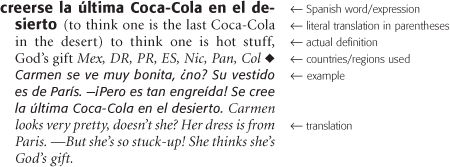
Definite articles indicate gender of nouns. Feminine forms of nouns are given in parentheses:

The feminine ending is typically added after dropping -o or -e; for example, the feminine form of el cuate is la cuata. If no feminine ending is given, the noun is invariable (it is the same in the feminine as in the masculine): el/la hincha (fan, sports enthusiast). When an expression requires a specific verb form in the second person (you in English), the t form is normally used rather than usted, since slang is primarily informal. Notes referring to register (level of formality) or to specific country variations are given in parentheses.
Here is a typical entry in the English-Spanish section:
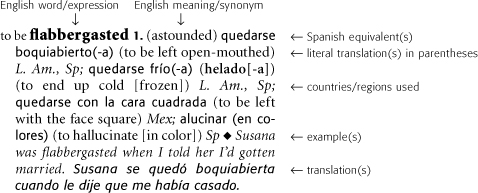
While no attempt was made to sanitize the language by eliminating off-color expressions, words considered vulgar are marked with the word vulgar in parentheses and some very strong terms have been avoided.
Native Readers
Native readers from many different Spanish-speaking countries helped to create the final manuscript. Each word or expression is accompanied by a list of abbreviations representing the countries and regions in which the word or expression is used. Where there is regional variation in the use of a particular expression, a note is made, preceded by the abbreviation RVAR.
Abbreviations
Country/Regional Abbreviations
Next page

